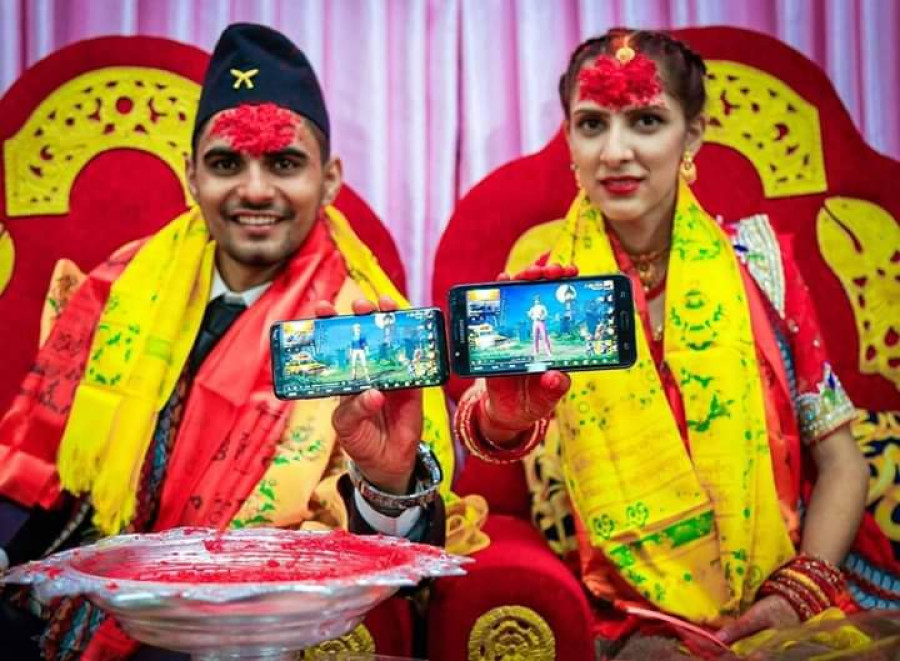Tue, Mar 3, 2026
Miscellaneous
Online gaming, despite stereotypes, is helping young people connect with each other
Bijaya Laxmi and Amit Baral (pictured) have an interesting story about how they met. The newlyweds, who got married last week, first encountered each other on the mobile game PlayerUnknown’s Battlegrounds.
bookmark
Abani Malla
Published at : January 3, 2019
Updated at : January 3, 2019 10:53
Kathmandu
Bijaya Laxmi and Amit Baral (pictured) have an interesting story about how they met. The newlyweds, who got married last week, first encountered each other on the mobile game PlayerUnknown’s Battlegrounds. A widely-circulated image of Laxmi and Baral on social media shows the two in wedding attire, holding up their mobile phones with the game running on the background.
While an older generation bemoans the lack of social engagement among today’s youth, games like PlayerUnknown’s Battlegrounds, widely known with its acronym PUBG, are connecting young people and allowing them to share common interests. With an engaging user experience and a number of avenues for communication with fellow players, the online game has become a popular leisure activity for young Nepali gamers. “Whenever I’m free, a game or two helps me pass time and connect with my old friends from school,” says Kriti Bisural, 25, a dental surgeon at Manmohan Memorial Community Hospital. “I’ve made friends with foreigners and it’s fun to connect with them during the game. It also makes me nostalgic for other action games I used to play growing up.”
Although PUBG has recently become popular in Nepal, other multiplayer online games like Fortnite Battle Royale and Dota 2, have long provided gamers with not just a platform to engage in a competitive activity but also to create virtual bonds that can often result in long-lasting relationships.
PlayerUnknown’s Battlegrounds is an online multiplayer ‘battle royale’ game, developed and distributed by PUBG Cooperation, a subsidiary of a video game company based in South Korea. The game begins with up to 100 players, including bots, diving from a jet plane and landing at any location on a map. The players’ mission is to loot their surroundings by collecting essential supplies like arms and ammunition, clothes, and health kits, and then defeat their enemies.
PUBG provides a shrinking battleground aimed at gathering the surviving players at a common point so that there is one winner in the end. Comprised of both strategy and humour, PUGB has managed to establish a community of loyal players, even here in Nepal.
“While other teenagers and youth are engaged in drugs and suffering from depression, we gamers spend our free time playing PUBG with our friends,” says 19-year-old Ashish Bantawa from Jhapa. Bantawa has been playing the game for almost a year now and is listed as one of the top 500 players from Nepal.
PUBG lets its players form squads of four and enables the microphone to let players communicate with each other while they play. Not only can they interact with their teammates by voice but also through actions that show their participation in the game.
Additionally, the game has a humourous set of titles to award its players, which also makes it fun for people to collect them and connect with others.
PUBG was initially released on the digital video game distribution platform Steam’s early access beta programme for Microsoft Windows in March 2017. It was officially released in December 2017 and within a year, it was available on almost all gaming platforms, including for free on both iOS and Android. Since then, PUBG has become one of the most-played online games, with more than 400 million players across all platforms. “When my friend introduced me to PUBG, my life changed drastically. I find myself playing even till 2 in the morning,” says 19-year-old Prasan Shrestha, who has been playing PUBG for eight months. “I love its graphics, maps, and the types of weapons the game has. It is also exciting to play such a high-end game on a device that fits in my pocket.”
Many in the gaming industry attribute PUBG’s popularity to the fact that it runs so well on mobile platforms, leading to many players in the developing world. Since the game is free-to-play on mobile phones, it has managed to reach a wide audience, providing entertainment while also acting as a conduit for social interactions. “What I like about PUBG is playing with friends in a squad game, making strategies and outperforming enemies,” says Bantawa.
Shrestha, who moved to Kathmandu for secondary school from Jhapa, left behind all his friends. But now that he’s been playing PUBG, he has managed to get back in touch with his old friends.
“PUBG has brought my old friendships back,” says Shrestha. “There were friends I hadn’t talked to in ages.”
Editor's Picks
Five and half decades of KP Oli in Nepali politics
How Facebook’s algorithm is amplifying one party over all others
Nepal’s IT exports near $1 billion. Can the momentum be sustained?
Parties’ lofty pledges on economy collide with hard realities
Upper house passes tourism bill with tougher Everest rules
E-PAPER | March 03, 2026
×




 14.24°C Kathmandu
14.24°C Kathmandu










